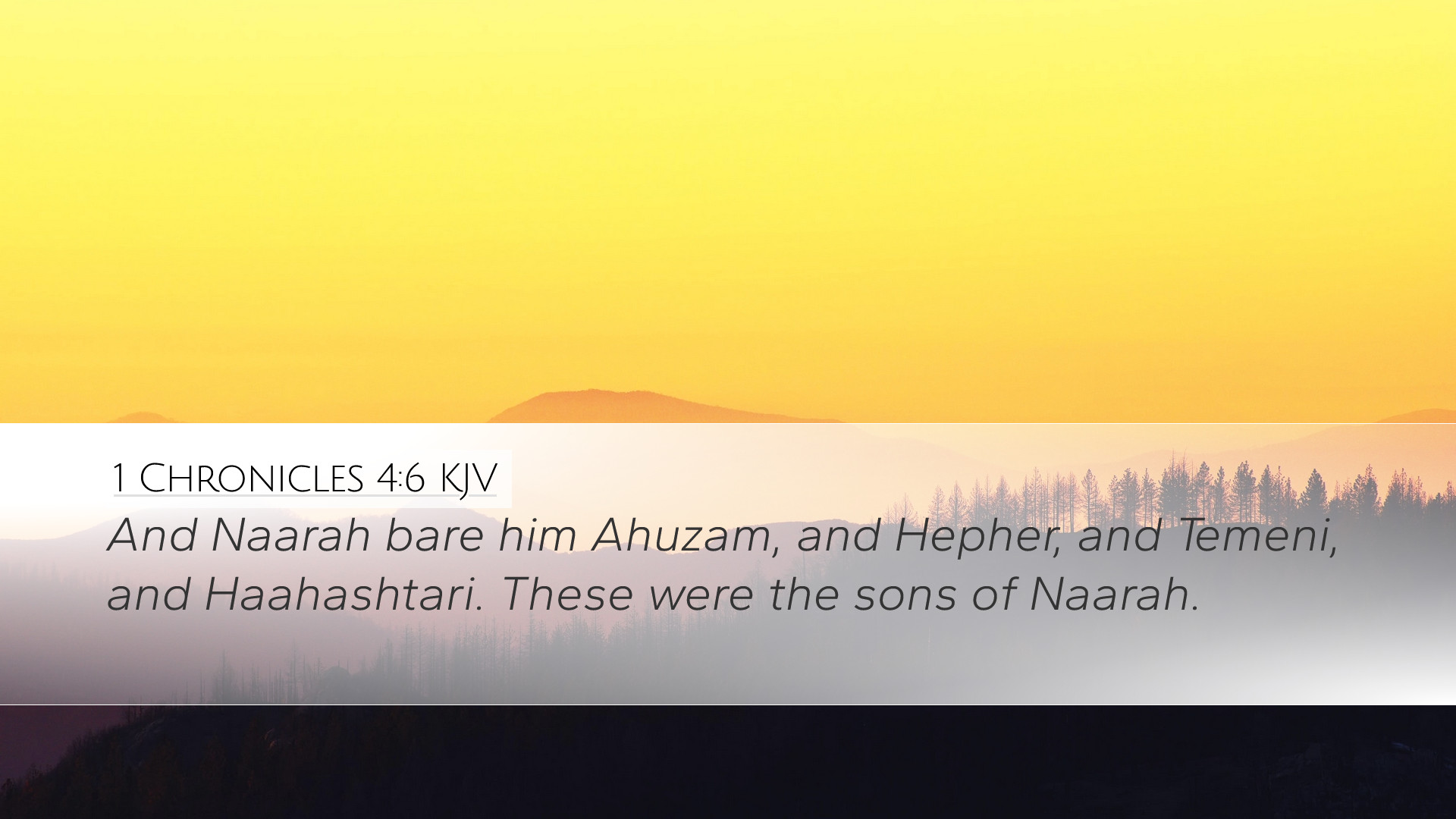Commentary on 1 Chronicles 4:6
1 Chronicles 4:6 reads:
"And Naarah bare him Ahuzzam, and Hepher, and Temeni, and Haahashtari: these are the sons of Naarah."
Historical Context
This verse appears within a genealogical record that lists the descendants of Judah. The genealogies in Chronicles serve to establish the legitimacy and heritage of the tribes of Israel during and after the Babylonian exile.
Insights from Commentators
Matthew Henry's Commentary
According to Matthew Henry, this passage highlights the importance of familial lineage and the establishment of families. He emphasizes that the genealogies found in Chronicles are not mere lists but carry rich historical and spiritual significance.
- Importance of Heritage: Henry notes that tracing lineage affirms God's promises regarding the seed of Abraham.
- God’s Faithfulness: Each name represents God's continued faithfulness in preserving a remnant even in times of adversity.
Albert Barnes' Commentary
Albert Barnes provides valuable insights focused on the names mentioned in the genealogy. He suggests that each name reflects characteristics or roles within the family line, illuminating the cultural significance of naming in the ancient Near East.
- A Symbol of Identity: Barnes states that names in the genealogies often convey deeper meanings, suggesting roles or attributes of the individuals.
- The Role of Women: He notes the mention of Naarah signifies the importance of women in God's plan and in establishing the family.
Adam Clarke's Commentary
Adam Clarke approaches the text with an exegetical lens, examining the meanings of each name. He ties them to broader theological themes, underlining the continuity of God's work through generations.
- Literal and Spiritual Implications: Clarke posits that the genealogical record serves dual purposes, both honoring the literal descent and indicating spiritual lessons for the reader.
- Lessons from Lineage: He encourages readers to consider the implications of their spiritual heritage and how it shapes their identity in Christ.
Theological Reflections
The genealogy of Judah, including the reference to Naarah, invites deeper theological reflection:
- Continuity of God’s Promise: The passage's placement in Chronicles reaffirms God's unwavering commitment to His covenant people. The genealogy serves as a reminder that God's plans often span generations.
- God's Sovereignty: Each generation reflects divine providence. The seemingly insignificant names remind believers that God works in the mundane aspects of life.
- Community and Identity: For pastors and theologians, the text reinforces the idea of community in faith. Each name contributes to the larger body of believers, echoing the New Testament theme of the body of Christ.
Applications for Today
For pastors, students, and scholars, the study of genealogies may seem daunting; however, this verse can yield valuable applications:
- Understanding Our Roots: It challenges believers to understand their spiritual roots and the legacies they inherit.
- Valuing Every Individual: Each name, though it may seem forgotten, plays a role in God's story, prompting leaders to recognize the value of every individual in their communities.
- Encouragement in Obscurity: Those who feel overlooked may find encouragement, knowing that even the smallest names in Scripture serve a purpose in God's grand narrative.
Conclusion
1 Chronicles 4:6 serves as a brief yet profound reminder of the faithfulness of God through generations. By engaging with this text through the lenses of esteemed commentators, readers can glean insights that enrich their understanding of Scripture and encourage their faith journeys. Genealogies not only document history but also illuminate God's enduring promises and the heritage of His people.


